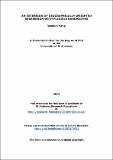Files in this item
An extension of geographically weighted regression with flexible bandwidths
Item metadata
| dc.contributor.advisor | Fotheringham, A. Stewart | |
| dc.contributor.author | Yang, Wenbai | |
| dc.coverage.spatial | viii, 152 p. | en_US |
| dc.date.accessioned | 2015-07-28T13:53:24Z | |
| dc.date.available | 2015-07-28T13:53:24Z | |
| dc.date.issued | 2014 | |
| dc.identifier | uk.bl.ethos.658925 | |
| dc.identifier.uri | https://hdl.handle.net/10023/7052 | |
| dc.description.abstract | Various statistical methods have been developed for local spatial analysis. Among them Geographically Weighted Regression (GWR) is a simple yet powerful method to explore spatially varying relationships between variables. This thesis examines how GWR can be extended to investigate spatially varying relationships at various geographical scales within one model. GWR assumes that observations near to a regression location have more influence on the estimation of local regression coefficients than do observations farther away. A single bandwidth is employed in basic GWR to control the rate of distance-decay in this influence. The magnitude of the bandwidth affects the scale of variation in the estimated regression coefficients and thus usefully reflects the appropriate spatial scale at which the processes being modelled operate. A small bandwidth suggests the processes operate over a local spatial scale, whilst a large bandwidth indicates a more regional process. In practice, a single bandwidth as in basic GWR may not be sufficient to reflect the potentially complex spatial variations in relationships between variables in a multivariate spatial model. Therefore, in order to estimate coefficient surfaces that may vary at different spatial scales for different variables, Flexible Bandwidth GWR (FBGWR) is proposed to allow different bandwidths to be individually specified for each independent variable in a regression framework. An algorithm based on back- fitting is developed to calibrate the FBGWR model. The performance of FBGWR is investigated with simulated datasets where coefficients are predefined at various levels of non-stationarity across space. A case study is then carried out on data relating to the Irish Famine to demonstrate the application of FBGWR to real-world processes. The results suggest that FBGWR can distinguish various scales of non-stationarity in spatial processes and provide an improved model over basic GWR. FBGWR therefore represents a useful development in the modelling of spatially varying processes. | en_US |
| dc.language.iso | en | en_US |
| dc.publisher | University of St Andrews | |
| dc.title | An extension of geographically weighted regression with flexible bandwidths | en_US |
| dc.type | Thesis | en_US |
| dc.contributor.sponsor | Science Foundation Ireland (SFI) | en_US |
| dc.type.qualificationlevel | Doctoral | en_US |
| dc.type.qualificationname | PhD Doctor of Philosophy | en_US |
| dc.publisher.institution | The University of St Andrews | en_US |
This item appears in the following Collection(s)
Items in the St Andrews Research Repository are protected by copyright, with all rights reserved, unless otherwise indicated.

